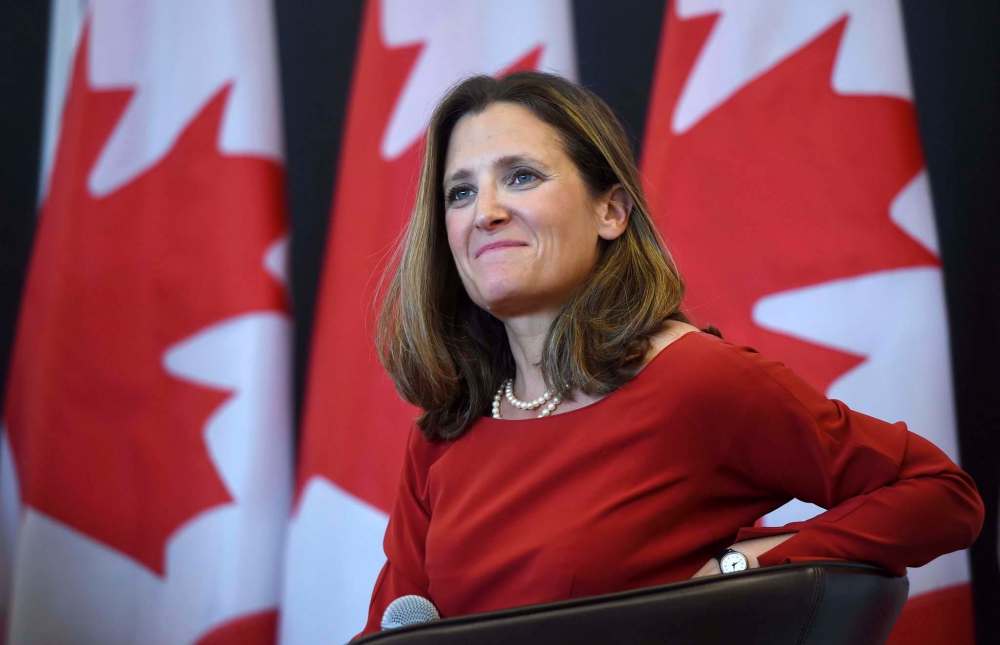Manitoba has less to lose or gain from NAFTA talks
Advertisement
Read this article for free:
or
Already have an account? Log in here »
To continue reading, please subscribe:
Monthly Digital Subscription
$19 $0 for the first 4 weeks*
- Enjoy unlimited reading on winnipegfreepress.com
- Read the E-Edition, our digital replica newspaper
- Access News Break, our award-winning app
- Play interactive puzzles
*No charge for 4 weeks then billed as $19 every four weeks (new subscribers and qualified returning subscribers only). Cancel anytime.
Read unlimited articles for free today:
or
Already have an account? Log in here »
Hey there, time traveller!
This article was published 13/08/2017 (2446 days ago), so information in it may no longer be current.
OTTAWA — Manitoba has evaded the spotlight as Ottawa opens up about its strategy for going nose-to-nose with the country’s biggest trading partner in crucial NAFTA talks.
Experts say the province has less to lose or gain when negotiations start Wednesday for a new North American Free Trade Agreement — though Manitoba could be caught in the crossfire if larger provinces trigger a firefight.
On Monday, Foreign Affairs Minister Chrystia Freeland laid out 10 core objectives for talks with the United States and Mexico.

They include increasing cross-border access to government contracts, adding to the professions eligible for work visas and reforming the process in which investors sue governments to preserve regulations that are made in the public interest.
Phil Cyrenne, a University of Winnipeg economics professor studying trade, says Manitoba is largely spared by the sticking points around Ontario’s automotive sector and Quebec’s protected milk producers.
“I think we can fly a bit under the radar in these issues,” said Cyrenne, adding that the Trump administrations seems much more interested in stemming Mexico’s NAFTA gains.
Freeland repeatedly assured MPs and journalists she would preserve the supply-management system, which regulates the production and pricing of dairy products, eggs and poultry.
That’s likely to reassure Manitoba’s dairy and egg farmers, though each group accounts for less than 500 people.
Yet Eric Millar, a Washington, D.C. consultant on Canada-U.S. trade, said supply management is an issue for all Manitobans to watch, because governors have already pushed against it, and might retaliate with other industries if they don’t make headway.
Similarly, Freeland said the longstanding softwood-lumber dispute is being negotiated “in parallel” with NAFTA, though it could be merged into the agreement.
Millar said the forestry industry plays a larger role in places like British Columbia and Quebec, but it’s a long-standing issue for the Americans that could spill over into the NAFTA negotiations, and undermine provinces like Manitoba.
“Softwood is one of those things that can poison the bilateral relationship,” he said. “It has been an issue literally since Congress imposed its first import tariffs in 1789.”
Manitoba’s worst-case scenarios include American changes on grain imports — something for which industry groups are watching but haven’t raised an alarm.
Another nightmare would be a revival of the country-of-origin dispute, in which an American law had imported beef labelled on grocery shelves. The World Trade Organization ruled the 2001 law discriminated against Canadian stock, and the U.S. repealed it in 2015.
Freeland also said Monday that Canada will push for stronger labour standards in NAFTA 2.0, as well as chapters on gender and Indigenous rights.
”Progressive elements are also important if you want a free-trade deal that’s also a fair-trade deal,” said Freeland. She believes Canada can find common ground on tougher environmental protections, though her opponents doubted the U.S. would allow the words “climate change” appear in the text.
While Freeland mentioned cutting red tape, the head of the Winnipeg Chamber of Commerce said Canada should’ve included harmonized regulations in its Top 10 list, to reflect how integrated the countries have become since NAFTA’s 1994 launch.
“Our economy is much more digital than it was back then,” said Loren Remillard. “The supply chain is further integrated across the border, and at the same time we have a smattering of regulatory jurisdictions.”
Manitoba’s provincial Trade Minister Cliff Cullen said Monday’s priorities are in line with what he’s heard from industry groups.
“We look forward to working with our federal counterparts to modernize NAFTA and ensure that any changes build on the gains under the existing NAFTA,” Cullen said in a statement.
Millar, who has advised the government on its NAFTA strategy, noted that Americans have been much more open about their goals, releasing a 12-page list of goals and demands.
Yet Millar met with Canada’s lead negotiator last week, and said he was impressed by how many people Canada’s team has consulted.
“I was heartened by how ready they are to go, and frankly how prepared they are. I think people in Manitoba can take heart with how well-represented we are in the negotiations.”
With files from the Canadian Press
dylan.robertson@freepress.mb.ca
History
Updated on Monday, August 14, 2017 11:40 PM CDT: removes cutting instructions



